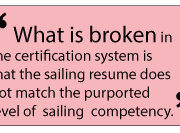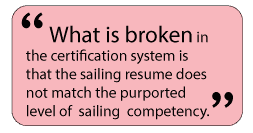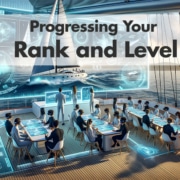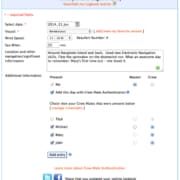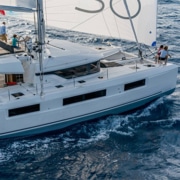What is The Biggest Lie in Sailing?
For years now, we have known about the biggest lie in sailing. It makes us so MAD and it is a huge disappointment to the average guy on the street wanting to skipper a sailboat on a sailing vacation. As a sailing education authority, we at NauticEd have tried to educate around it. But recent events have led us to just come right out and publicly expose the lie.
Before I divulge, let me preface by saying that we believe the goal of sailing education and training is to ensure competence. And competence is achieved from gained theory knowledge, training, and experience. Competence is ultimately what a sailing student is paying for when they go to a sailing school. The certification that is awarded at the end of training should be recognition that a certain level of competence has been achieved. But would it surprise you if the certification itself has become the norm end-goal in the sailing industry without regard to competence?
As background, as well as being a Coast Guard recognized national sailing education body, the Nauticed team are yacht charter agents. That means we find sailboats for people to rent on a sailing vacation all over the world. It makes sense– we educate and train people to sail so we might as well help those people also go on their dream sailing vacation as well. There are hundreds of yacht charter companies worldwide and we have rented charter sailboats, big and small, monohulls and catamarans, to hundreds and hundreds of people. I’ve personally met with about 100 companies including about 30 at the recent 2018 International Charter Expo in Zagreb Croatia. I say that because I know yacht charter companies; I know what they want in a client, I know who they accept, and I know who they turn down for charters.
And so here is the biggest lie in sailing.
“Yacht charter companies accept a bareboat sailing certification as enough proof of competence to charter their yachts”
This simply is not true.
Unfortunately, this lie is perpetuated by sailing associations – we call them certification factories. They make money by issuing bareboat certifications and supposed certificates of international proficiency for every student without regard for demonstrated competence — the instructor simply issues the certification the student paid for. Shame on them!
Even if true competence is demonstrated and a bareboat charter certificate is awarded, a potential charterer without experience cannot skipper a yacht on a sailing vacation – even with certificate in hand. In this case, it is not really the fault of the school or instructor. There are so many good instructors out there who unfortunately have to put their reputation next to those who are rubber stamping. Rather, is the fault of the certification system created by the sailing association. Thus their own certifications have been watered down.
To test out this statement, call any yacht charter company and ask them. Say:
“I have a bareboat charter certification from … (any of the sailing education associations or companies (including ASA, US Sailing, Sail Canada or even NauticEd)). Do I qualify to charter a boat from you”?
Here are the phone numbers for the biggest yacht charter companies
- Sunsail – 1 (888) 350 3568
- Moorings – 1 (800) 334-2435
- Dream Yacht Charter – 1 (855) 650-8902
- BVI Yacht Charters – 1 (284) 494-4289
Their answer will be ” … well, could you send us your sailing resume? How much experience do you have”?
At which point you know you have been lied to. Lied to by sailing associations and lied to by (some, not all) sailing schools.
The impetus for this exposure of the lie was several recent potential yacht charter clients for our agency who have called in. The conversation goes like this:
Potential Client: “Hello, I’d like to charter a boat in …” (the BVI’s, Grenada, Antigua, Martinique … (wherever)) “… can you help me organize that please”.
NauticEd Agent: “Oh sure, glad you called. Welcome to NauticEd. Can you tell us about your experience please”?
Potential Client: “I have ASA 101 through 106” (or US Sailing Bareboat Cruising Certificate, or Sail Canada Bareboat Certificate)
NauticEd Agent: “I meant how much actual on the water experience do you have – sailing”?
Potential Client: “Well, I have ASA 101 through 106”
NauticEd Agent: “Yes but before that or after that how much sailing experience do you have”?
Potential Client: (getting frustrated) “That’s it – I got my experience doing the certification and NOW I WOULD LIKE TO RENT A BOAT PLEASE”
NauticEd Agent: “My apologies. Ok, so we can do that except more than likely …” (trying to soften the blow coming) “… the charter company will need you to have a captain on board during the charter”.
Potential Client: “That is NOT what I was told. I was told that when I have my certificate, I would be qualified to rent a boat.”
NauticEd Agent: “I’m so sorry you were told that. How many times can you get out on a sailboat of a similar size to the boat you want to rent between now and the time you want to go”?
Potential Client: “So I spent all that money for naught”?
NauticEd Agent: “No, of course not! All training is good training. Let me pass you over to Mr Grant Headifen – the Global Director of Education for NauticEd. He can explain to you what the REAL requirements are to rent a sailboat on a sailing vacation”.
Potential Client: (huge disappointment) “Fine :(“
At which point I take over and help the potential client through his grief and anger. I simply explain the requirements from the yacht charter companies….that they require an experience-based sailing resume.
###
I have another story even more upsetting.
A recent potential client of ours has ASA 101 through 104. He had gained the certification in the Caribbean through a company that is a sailing school AND a yacht charter company. He called us about chartering with the same charter company he got his certification through. The conversation with the potential client was identical to the above. The client was insistent that the school told him he could charter with his certification. So, I went further and called the charter company:
Me: “Hey do you remember your client John in March this year? He now wants to rent a yacht from you”. (Not his real name to protect the victim)
Charter Company response: “Oh yes sure – great student! We can rent him anything he likes as long as he has a captain on board”.
Me: “But you gave him a bareboat charter certification”!!!!!!!!!!!!!
Charter Company: “Yes he met the requirements”.
Me: “But you are now turning him down”
Charter Company: “Yes – unless he has gained a lot more experience in the past few months”
Me: “No he is landlocked and has not”
Charter Company: “We can rent him anything he likes as long as he has a captain on board”.
And I agree that he should not be able to take a sailboat out in the open ocean by himself with friends and family onboard. He simply does not have sufficient experienced. But I have a huge problem with the certification factory companies that spit out lies and worse yet – false expectations and false confidence. John above, was convinced that he qualified and he held the piece of paper that said he was qualified.
###
Another story – slightly different.
A charter client was recently able to pass the charter company minimum experience requirements. At the time of booking, I told him his resume was extremely light – too light in my opinion. Additionally, his experience was all on small keelboats. I convinced him to at least spend one day with a local NauticEd instructor to learn how to maneuver a large keelboat in a marina and to go through our Maneuvering Under Power course so that he would not damage the charter boat in the tight marinas of the BVI. Because of his time constraints, he did that training but no more. And off he went. On the day of departure, he called me freaking out about a supposed cyclonic system approaching the BVI. A quick look at the weather map showed no cyclone but a tropical wave. Tropical waves tend to increase wind at the compression point. So I said to expect 25-knot winds for the first few days. (Part of skill, experience and knowledge means being able to do a lot of things including to read a weather map.)
His report upon return was that he could not handle the 25 knots and the waves it produced. That they nearly died … that they could not grab a mooring ball in the wind … that they cut themselves up … that the waves were too big … that they had to call the base to send someone out to save them!!!!
The BVI is promoted as this gorgeous benign safe starter place to go charter a yacht – that you’ll be ok – just go – limited experience is ok because you will get it there. NOT SO. Because of a lack of experience, these people could have easily ended up on the rocks and rocks in the waves can = death.
###
One Last Story
We just received a charter request from a couple who announced in their request email that they have a qualification from ASA for bareboat chartering BUT they say they are not comfortable with their abilities and so are requesting a Captain on board.
I applaud this couple – how smart and responsible. At the same time, I am appalled at the Association who would issue such a qualification to the very person who would announce upfront “I am not comfortable with captaining”. Why were they not issued a “Crew” competency certification instead?
###
My Point
My point is: What is broken in the certification system is that the sailing resume does not match the purported sailing competency. And thus yacht charter companies are completely right when they turn down clients who try to charter a yacht when all the client has is a sailing certification with little experience.
Yacht charter companies demand that the client have an acceptable resume.
In our back-end travel agent software, here is a statement next to the area where the client must enter their sailing experience:
We require to see all SKIPPERING experience on COMPARABLY SIZED SAILING VESSELS (e.g. same length OR bigger vessel) TO THE VESSEL YOU WISH TO CHARTER with details (type of journey, length etc). Skippering a smaller vessel or sailing/crewing on a comparable or bigger vessel will NOT qualify you. Resumes will not be approved without the suitable experience being listed.
They put it in red – we did not do this for effect.
Then why are sailing associations promoting certifications and telling people that “With a bareboat sailing certification, you qualify to charter a yacht on a sailing vacation”?
THE TRUTH
The truth is that you must have an acceptable sailing resume to charter a yacht. There must be plenty of sailing experience documented on the resume. And there must be experience as skipper of the vessel on a vessel similarly sized as the one you are renting.
Typically, we find that you should be comfortable sailing a vessel up to 10 feet greater than what you are normally comfortable sailing. For example, if you sail a 30-foot boat at home, then you should be comfortable sailing a 40-foot boat on a sailing vacation – and the yacht charter company will typically let you have it.
WAIT! – NAUTICED GIVES OUT SAILING CERTIFICATIONS
Yes! NauticEd does give out sailing certifications but our approach is completely different. We focus on the student building their sailing resume. At milestones along the way, the software issues a sailing certificate that is representative of the real ability of the student. And the student can give access to anyone who they desire to see their resume. They give their registered NauticEd email address and their secret logbook code (not their password silly – their logbook code that they create in our system in order to let others see their resume).
Thus, for a NauticEd bareboat charter certification, the NauticEd software ONLY issues the bareboat charter sailing certification when the student’s resume demonstrates sufficient skill, experience, and knowledge to a point where any charter company will automatically accept the certification because it meets their chartering requirements. For a bareboat charter certification, the student’s electronic logbook must show 50 days of sailing experience, 25 of which as master of the vessel and 25 of which has been on a boat greater than 28 ft – plus the student must pass the whole suite of bareboat charter knowledge courses. The knowledge courses are done online in an enjoyable multimedia, interactive format.
Take a look at Joseph Sailor’s resume – he is our example student. Go to www.nauticed.org/student_verification and enter “joseph@sailor.com” and use logbook code – “mycode”. For one, you’ll be impressed with Joseph. But second, you’ll be impressed with the resume format itself. This resume is accepted by 100% of yacht charter companies as demonstrating adequate experience. To reiterate the point, if Joseph’s resume was not adequate in any way, he would not have the Bareboat Charter Master Rank and certificate.
Access to build a NauticEd sailing resume is FREE to all. We provide for free an electronic logbook whereby you enter your past sailing experience, then the resume building software takes over. To achieve a certification Rank, the student must take and pass our online theory sailing courses as well as log sufficient experience in the electronic logbook. When the NauticEd assessor properly observes on-the-water bareboat competence, the assessor clicks a button which then automatically displays a “Verified Practical Bareboat Competency” stamp on the student’s sailing resume.
IF you already hold a certification and feel as though you already have the theory knowledge, THEN you can just jump to the online test at the end of each module. I think however you will find that our courses are so in-depth and comprehensive that no matter what training you have previously done, you will find the theory coursework challenging. That is a good thing! It means you are learning more.
PRACTICAL TRAINING VERSUS ASSESSMENT
Now I want to address the practical training misconception. Too many sailing associations are issuing the certificates above after the student spends a requisite amount of time being trained. There are the zero to hero courses and others promoting “get your bareboat certification in a week” or even a weekend. But a trained person is not necessarily competent. You can’t make those promises.
Just now as I was writing this, one of our instructors called me and was relaying a story about how a friend of theirs was complaining because she had been issued a 104 bareboat charter certificate but on the day of training the wind was so light that while she held a piece of paper that says she is “qualified” she herself did not feel as though she could do the tasks competently. If she was to be assessed for a bareboat chartering task, she certainly would fail.
So, there is a vast difference between training and assessment. When the United States Coast Guard released the American National Standards for Training and Assessment they thankfully used a well-known educational standard called rubrics. A rubric is the assessment of a small task whereby the student is graded on that small task. The assessor can then have an objective view of real competence by viewing the grades over the full sum of tasks, and by considering critical and non-critical tasks. Only then can the assessor give an overall grade: “Today, John, in viewing your performance, I’m going to assign to you a competent crew-member competency”. OR “Today, Bill, in viewing your performance, I’m going to assign to you a skipper level competency”.
Assessment is critical to the issuance of any qualification. NauticEd is the only sailing education body that requires its schools and instructors perform a rubrics assessment on students. Our instructors are well armed to issue the competence grade that is becoming of the student.
All NauticEd instructors worldwide are rated by every student after every training. The ratings are posted on the school’s NauticEd website for all to see. One question that our software automatically asks each student after a competency grade was issued is “Did your Instructor explain and use a National Standard Rubrics assessment methodology?” We monitor every result to make sure this is done.
I want to copy in this instructor feedback that we received 3 days ago from a student about our NauticEd Instructor, Bruce Schwaegel with NauticEd School Landfall Sailing in Austin, Texas.
Instructor: Bruce Schwaegel
School: Landfall Sailing
Robert S has completed the following rating and feedback of their practical instruction with them.
Teaching Ability: 5 of 5,
Depth of Knowledge: 5 of 5,
Friendliness: 5 of 5,
Condition of Vessel: 5 of 5,
Professionalism: 5 of 5,
Comment: It’s hard to sum up my experience with Bruce in a few short sentences. We are transiting the Atlantic on our catamaran next spring and I needed to complete the SLC to meet clearing-in requirements. I completed the required coursework and testing on Nauticed.org, and then proceeded to the practical assessment. The assessment was administered by Bruce. He added much more value than a typical assessor. Before, during and after the assessment, he was not just performing the assessing. He was interacting to gain a full understanding of my abilities, my boat, and my sailing plans. After the assessment, he provided an array of useful tips and opinions that will be invaluable on our journey. The assessment itself was rigorous and comprehensive. The detailed rubric left me with a clear understanding of my strengths and exposed weaknesses to me; things every serious sailor should know about him/her self. This was a pass/fail assessment. Even with a passing score, the rubric format identifies areas of potential improvement and Bruce provided substantial guidance to achieve excellence. He has even offered to provide additional exercises to help hone my knowledge. One couldn’t ask for more.
Did your Instructor explain and use a National Standard Rubrics assessment methodology? Yes
Note that the student himself was valuing the identification of the weaknesses from the rubrics assessment. Next note what an amazing job this NauticEd instructor did – that deserves a wow and kudos.
Bruce goes further too. He uploads the assessment rubrics documents into the NauticEd system so that the student can refer to them later on. On the student’s online profile, he makes private notes to himself about the student’s learning style, notes to the student reflecting remediation and improvement plans, and instructor notes within the students profile so he and other instructors can refer to later when the student comes back for additional training and assessment.
All NauticEd schools operate in this manner. They focus on true competence and measure it with rubrics assessments of each and every task before signing off on a student. And THIS IS WHY the NauticEd program is bringing trust back into the sailing education program. But for now, we are the only ones. I applaud our schools for the commitment to competence. I’m ashamed that some other sailing education programs continue to operate the way they do.
STANDARDS
Our standards might be too high for some. And that is okay. We feel good about that. It means that we are doing it right. The point to standards is to provide a line of acceptance that you STAND by.
When you have your standards written in software, you cannot fudge it – either you pass or you don’t.
For example, we know that other sailing association instructors get pressured by students sometimes to give them a pass. We know that some of those instructors just issue an automatic pass because the student paid the money, and we know that some of those instructors help students with test questions to get a pass.
With the NauticEd software, even if the instructor signs off on the on-the-water competence, the student cannot gain the bareboat charter certification unless the 50 days experience requirement is met. Meaning that the certification is a real representative of a properly documented sailing resume. Get it? When the Resume meets the requirements, only then is the Certification issued.
At the same time – I have to say that there are plenty of really good and caring instructors that care about standards and competence. I acknowledge you for doing the right thing. But who are you? Where are you? Because all instructors wear the same hat that say “Sailing Instructor”. Charter companies cannot tell you apart from the certification factory ones and that’s why charter companies have lost faith in sailing certifications. One thing is for sure: when schools and instructors work inside the NauticEd system, they are given standards with checks and balances. While Instructors use the rubrics for on-the-water competency assessment, the NauticEd software only issues the certification when all the other proper conditions are met. NauticEd schools and instructors do not subscribe to being part of a factory.
To this point, NauticEd is the only body in the United States that meets the American National Standards for Sailing Training and Assessment. This standard was created by the United States Coast Guard. And there is a reason we stand alone in this.
SUMMARY
Instead of focusing on a sailing certification which is what the certification factories have told you, focus on building your sailing resume through knowledge (coursework), skills (experience), and instructor training and assessment. At NauticEd we have all the tools for you to achieve an awesome Sailing Resume. Including being the only sailing body able to issue a sailing certificate recognized by the United States Coast Guard as adhering to the American National Standards.
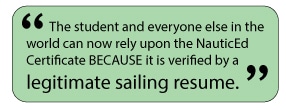
Get started today – sign up and get two free sailing courses, a free electronic logbook, a free sailing resume building tool, and access to instructors and schools that will train for competence and subsequently issue a respected sailing certificate.
Sincerely,
Grant Headifen
Global Director of Education
NauticEd International Sailing Education

